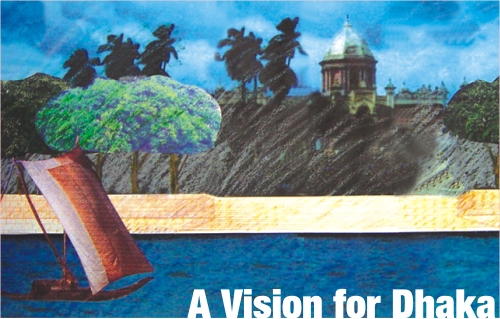 |
|
 |
|
 |
|
 |
|

A city for the delta
We have tried to articulate a vision, a prospect for a future Dhaka, to offer ideas that are not necessarily going to be ushered in right away but become part of a common desire. The future begins from there. Here are some thoughts and ideas for a prospective Dhaka, some culled from earlier pronouncements, and some gathered anew for this special supplement.
Kazi Khaleed Ashraf and Saif Ul Haque
Kazi Khaleed Ashraf is an architect and architectural writer, and teaches at the University of Hawaii in the USA. Saif Ul Haque is an architect and architectural activist practicing in Dhaka. They have prepared this part of the supplement and looked into the architectural aspects of Dhaka city in detail. Both are authors of a number of publications on architecture in Bangladesh.
What a city is
A City is civilisation. The city today has become harder and harder to define, yet that persistent idea is still conveyed by the popular English term. The term “city” is linked to the Latin word civitas and to civilisation and citizen, and therefore describes the finest form of civic, collective life. To Jaime Lerner, former mayor of the miraculous city of Curitiba, the future is in cities and cities can be the most beautiful collective dream (Lerner gained world-renown by turning around the destiny of this once browbeaten Brazilian city). He rejects the notion that the city is a problem; it is, in fact, the solution to collective existence. The city is the most obvious site of how we should live as a decent society. To Louis Kahn, a city is simply but very poignantly a place where a child walking its streets one day decides what she wants to do with her life. A city, first and foremost, is a collective place, where the ingredients of civilisation flourish in a sustainable way, and where an individual discovers in that collectivity his or her purpose and meaningfulness.
In the grand sweep of our agricultural rhetoric, our deep and ancient sentiment for the soil, we continue to see the city as a curse. We fail to acknowledge the emerging truth that in the first time in human history nearly half of the planetary population is now urban dwellers, and that the city is now as essential and crucial as the paddy-field.
The city is a complex organism. As the city draws people from different economic, ethnic, social and racial categories into one space, the most critical need for a city is a civilised mode for addressing differences. The finest city is where such differences and complexities find a hospitable reception and recognition.